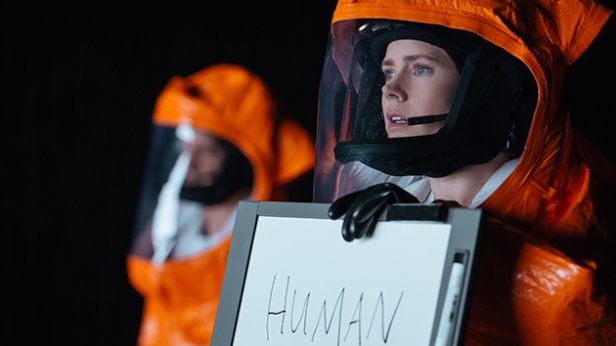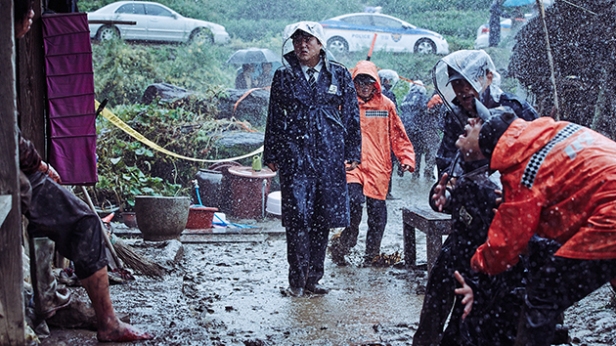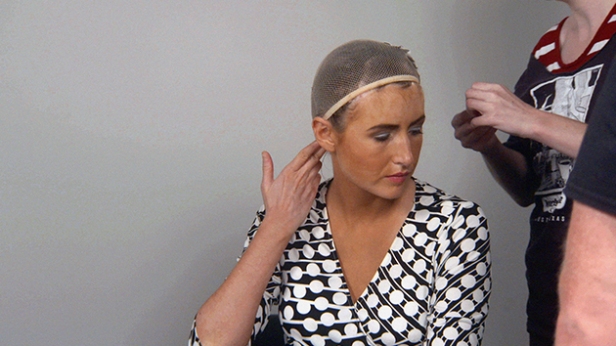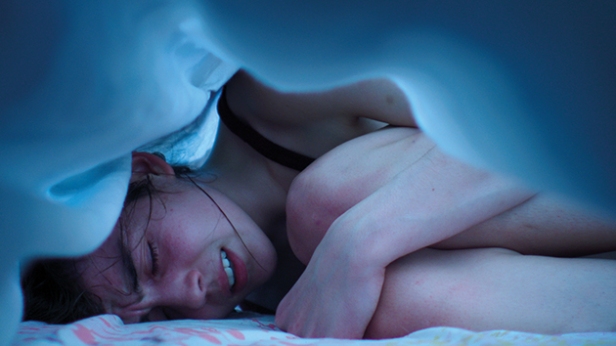The fifth day of the London Film Festival impresses with an intellectual sci-fi, two grisly foreign gorefests, and a curious pseudo-documentary about a forgotten televised suicide.
After the disappointment of LFF Day Four, I had to weigh my choices carefully to those that I had been anticipating, rather than those that fit in with my schedule. Luckily for me, each one of them pulled off their sometimes ludicrous but always absorbing ambitions.

The festival returned to form suddenly and unexpectedly with the absolutely stunning Arrival (A): Denis Villeneuve’s science fiction magnum opus, which isn’t just the best of the 60th LFF so far, but also one of the best films of 2016 (and is it too early to call it one of the best sci-fi films of the decade? I doubt it). After a brief narrated introduction, Arrival hurls us into the deep-end of an alien invasion that has seen twelve monolithic oblongs hover over Earth. Amy Adams is truly majestic as the introspective Louise: a top linguist who is called upon to decipher an alien language before the superpowers of the world can retaliate against them with force. From the beginning – as with each of Villeneuve’s films – there are sly clues and red herrings aplenty that I must’ve missed a handful of, but the impact of these cues and their relative consequences is so powerful that it’s hard to think of superlatives to describe how effective the second-act punch is. Villeneuve is no stranger to purposefully didactic filmmaking, and here he promotes theories of determinism and causality with complete faith in the audience: there’s very little handholding and his screenplay is void of condescension. Arrival pretty much defies adjectives and has made me reconnect with the intellectual and awe-inspiring power of cinema as a medium. Maybe it’s too early to say, but it could be this generation’s Close Encounters of the Third Kind, and that’s not hyperbole.

I wasn’t entirely sure I was going to watch The Wailing (B+) after Arrival‘s intricacies were swimming in my mind, but I’m glad I did. It’s a deceptively simple story: a stranger’s appearance in a small town coincides with a mysterious sickness plaguing the townsfolk, and it’s up to policeman Jong-Goo (Do Won Kwak) to discover if these two seemingly separate problems are linked. Thematically, its genres are all over the place, throwing in a police procedural, a family exorcism drama, a ghost story, and a heavy dose of absurd, slapstick comedy, it operates on a level that doesn’t seem at all possible, yet it somehow pulls off each of these completely bonkers ideas by the time it reaches its grisly conclusion. I actually gave up trying to figure out the serpentine loops, because although it looks simple, it’s quite the opposite. Full of duplicitous characters with unclear motivations, it plays out like a game of demonic chess, with shamans and ghosts and demons sending the small town into total havoc. Fourteen-year-old Kim Hwan-Hee is terrifyingly good here and I’d go as far to say that she’s the MVP of scream queens at this year’s festival: the way she shrieks and cries is remarkable, exuding pain, fear and piercing sadness in the space of a few simple yells. Her scenes make for some truly ear-splitting moments that heightened the effectiveness of the scares. The Wailing takes a long time for its composite pieces to converge, but part of the fun is watching how this muddy, grimy film does it.
Kaleidoscope will be releasing the film in the UK and Ireland on 25 November.

Coming off the back of demonic possessions and ghostly killers (with a whiplash-inducing 10-minute turn-around between the two) was Kate Plays Christine (B-) a striking documentary that blurs the line between artifice and truths with a shockingly unique twist. Kate Lyn Sheil plays both herself (in the documentary) and Christine Chubbuck (in tanned and costumed character): a news anchor for a small cable channel in Saratosa, Florida, who – in 1974 – committed suicide live on television. This shocking story is understood to be the basis of Peter Finch’s acclaimed monologue in Sidney Lumet’s Network (a film that’s referenced more than once in Kate Plays Christine). As a documentary it’s fascinating, but as a piece of performative art, it’s lacking in focus and distinguishable insight. It’s marginally unfair to use its distorted focus as a detriment to the film, but it’s hard to overlook when it’s articulated by Sheil herself that the focus is lacking. There is a reason for this: there is very little information in public record about her depression and the actions which led to infamy, and the only tape that exists has remained hidden for 42 years, seen by very few. To embody this character, Sheil needed to hear her talk, or watch her move, but it wasn’t until much further in her research that she was privy to an old video in her ex-coworkers’ personal VHS collection, but still the infamous tape remained withheld. Her portraying of Chubbuck’s final words are strong but delivered with a bluntness that embitters the preceding minutes. I’ve always been a fan of Sheil (just don’t call her “subtle”) and I’ll defend my sentiment that she does ‘mumblecore’ better than everyone’s darling Greta Gerwig, and here she puts in an outstanding amount of effort that smears those lines between what we want and what we see. But without full insight, neither Chubbock, nor Sheil-as-Chubbock, feel fully formed.

The final film of the day put the nerves in me before I had even sat down. Lately, the idea of watching a horror that has had overwhelming word of mouth fills me with dread more than the films themselves. Each year the “scariest movie of the year!” suffix is thrown around so often that I’ve lost count, and it always results in disappointment i.e. The Witch, The Invitation etc., so I’m thankful that I knew very little about Raw (B+) except hearing of modest buzz just hours before. Its backdrop is, in itself, pretty tremendous. A new year begins at veterinary school which happens to have a particularly brutal way of hazing the ‘rookies’: this week-long ritual involves Carrie-style blood-drenching, boisterous destruction of dorms, and drug-and-vodka fuelled mega-parties. Garance Marillier plays Justine, one of the newbies being pulled into the lifestyle of parties and meat (she’s a vegetarian, see), and its during this initiation that she has a life-changing sexual awakening. Marillier is completely transfixing, emanating an adorable charm but with a sinister violent tendency, and it’s thanks to first-time director Julia Ducournau’s witty screenplay that Justine’s coming-of-age is often hilariously visceral yet always plausible. Raw is immensely progressive (the antithesis to Day Four’s screenings), with both hetero- and homo- sexuality played as matter of fact, with female characters driving their own sexuality and adulthood by using what they have to get what they don’t have. It’s refreshing to see that these characters could have been all males, but in doing so the film would have made much less of an impression.
I was beginning to think that the horror genre was maintaining the streak of outright crap that’s been released constantly, but instead, South Korea’s The Wailing was more a thrilling ghost story than The Conjuring 2, and female cannibals were better depicted in Raw than in The Neon Demon, so perhaps it’s not that all horror is bad, but that American is simply anaemic. All of Day Five’s films are worth your time, so keep an eye out for release dates, and be sure to see Arrival on the biggest screen possible when it’s released nationwide on 9th November.
Arrival illustration header by cal.con.
Follow him on Instagram.

